 Boomali Aboriginal Art Gallery
Boomali Aboriginal Art Gallery
ONLINE NOW
Curated by: Kyra Kum-Singh
Visit the link below to view the exhibition:
https://
$l10n parameter must be an array. To pass arbitrary data to scripts, use the wp_add_inline_script() function instead. Please see Debugging in WordPress for more information. (This message was added in version 5.7.0.) in /home/filefaus/public_html/old/wp-includes/functions.php on line 5835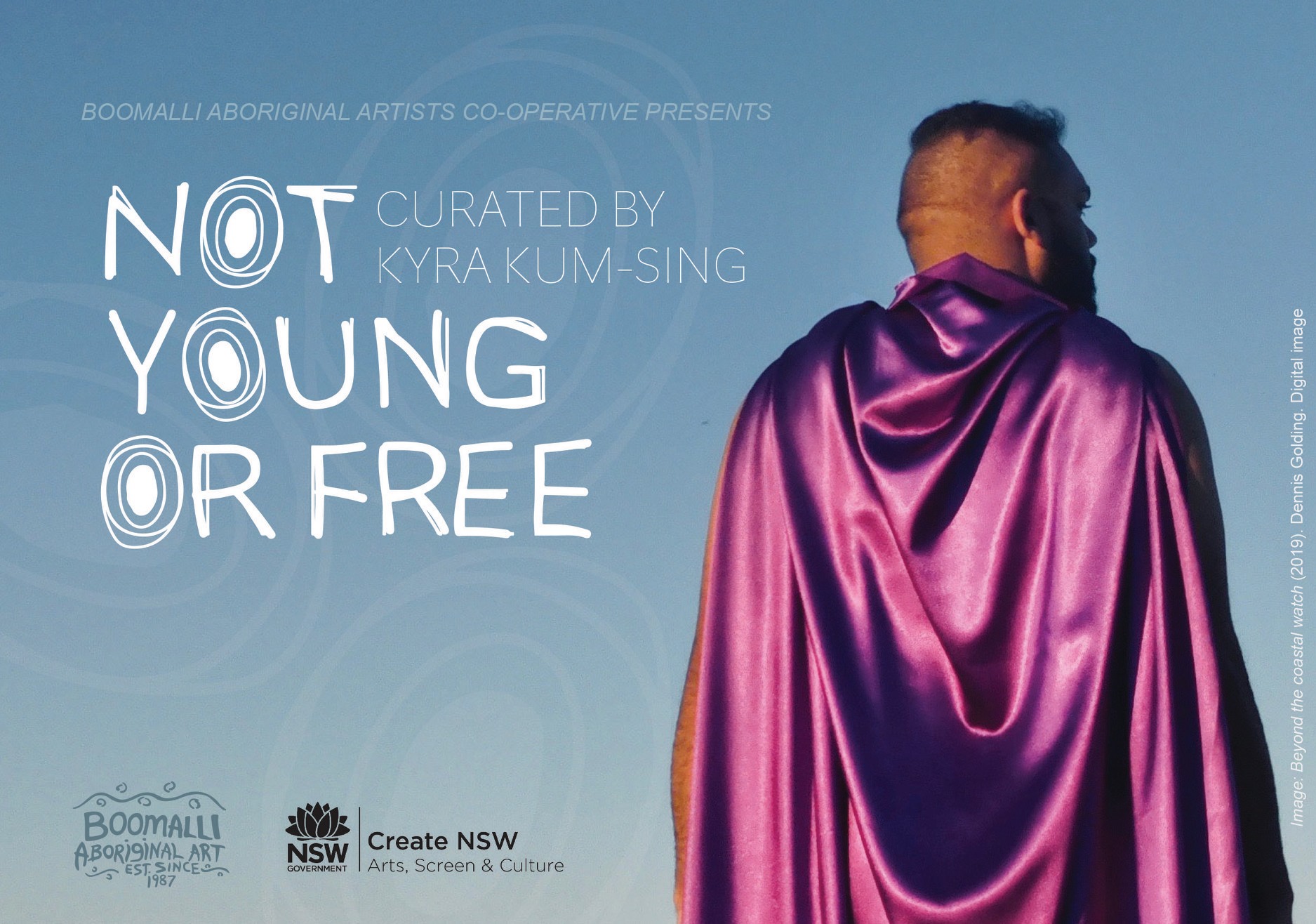
 Boomali Aboriginal Art Gallery
Boomali Aboriginal Art Gallery
Curated by: Kyra Kum-Singh
Visit the link below to view the exhibition:
https://

 Join the Coalition for Justice and Peace in Palestine for this year’s Nakba Commemoration which will be an online screening of the film “Gaza Fights for Freedom” with an introduction by renowned Palestinian politician, activist and academic Dr Hanan Ashrawi and Australian lawyer, Hiba Farra.
Join the Coalition for Justice and Peace in Palestine for this year’s Nakba Commemoration which will be an online screening of the film “Gaza Fights for Freedom” with an introduction by renowned Palestinian politician, activist and academic Dr Hanan Ashrawi and Australian lawyer, Hiba Farra.
Send us an email to register for the screening and we will send you the Zoom log in details – cjpp@coalitionforpalestine.org
This documentary by Abby Martin tells the story of Gaza – past and present, showing rare archival footage that explains the refugee history from the Nakba which is never acknowledged by media. Interviews and footage from the ongoing Great March for Freedom in Gaza, features Palestinian journalists, medics and the family of internationally-acclaimed paramedic, Razan al-Najjar.
At its core, ‘Gaza Fights For Freedom’ is a thorough indictment of the Israeli military for war crimes, with legal documentation and photographic evidence. 
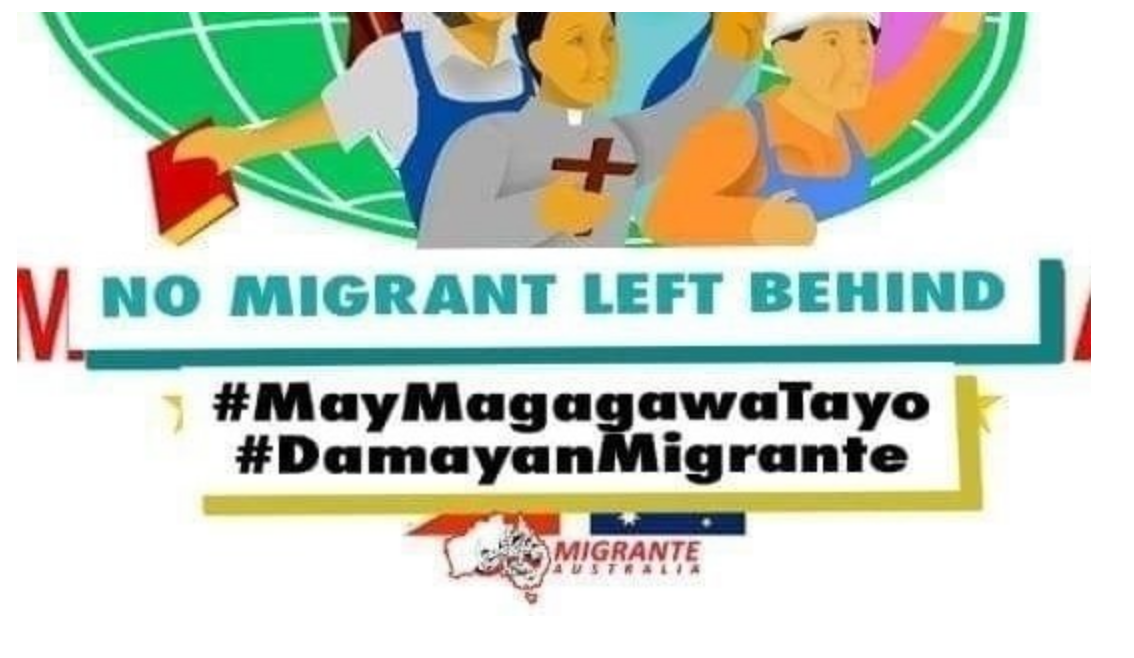

Gladys Berejiklian
New South Wales Premier
Dear Premier Berejiklian:
We’re writing in behalf of international students and other temporary visa holders in NSW whom we have engaged with in Damayan Migrante. Also attached to this email are the letters from some of the international students themselves who seek to share their stories with you.
Damayan Migrante is a response of Migrante New South Wales to how COVID-19 crisis has affected the temporary visa holders especially the international students. While this crisis has adversely affected all sectors in society, this demographic suffers the brunt of the government’s restrictions directly affecting the service and hospitality industries where majority of them are casually employed.
NSW hosts the biggest number of international students in Australia, and we believe you will agree with us that their contributions to the state have been invaluable. These contributions range from economic to cultural, they are an intrinsic part of NSW community. They are in aged care and disability facilities, restaurants, cafes, maintenance and cleaning services. As you will agree, these are essential services which are filled up by the temporary visa holders. Furthermore, international education as we already know is the fourth largest export of Australia and NSW receives the biggest slice of the revenues. Statistics show that NSW universities and colleges earn some $14 billion annually.
Now that they find themselves in dire straits through no fault of their own, we are disappointed over the willful inaction of the state government of NSW mirroring the attitude of the federal government.
However, we are still hopeful that NSW will join the efforts of the other states and territories in offering assistance packages to demonstrate their duty of care to the vulnerable members of our society. It is high time for NSW to deliver as mass organisations’ efforts such as Damayan Migrante have been fulfilling the responsibilities of the government in providing support and mutual aid.
We join our counterparts across various communities in NSW in calling for immediate assistance to all temporary visa holders.
The NSW government has already lost valuable time in coming to their aid and as the other states and territories have shown, you cannot continue to turn a blind eye to the evident need to act. This is an unprecedented crisis and no one should be left behind on the basis of their visa status.
We look to your leadership to steer the NSW community to respond to COVID-19 crisis as “we are in this together.”
In the service of our communities,
(Signed)
Ej dela Cruz
Damayan Migrante Coordinator
Edwin Subijano
MIGRANTE NSW Public Information Officer
CARMELITA BALTAZAR
MIGRANTE AUSTRALIA
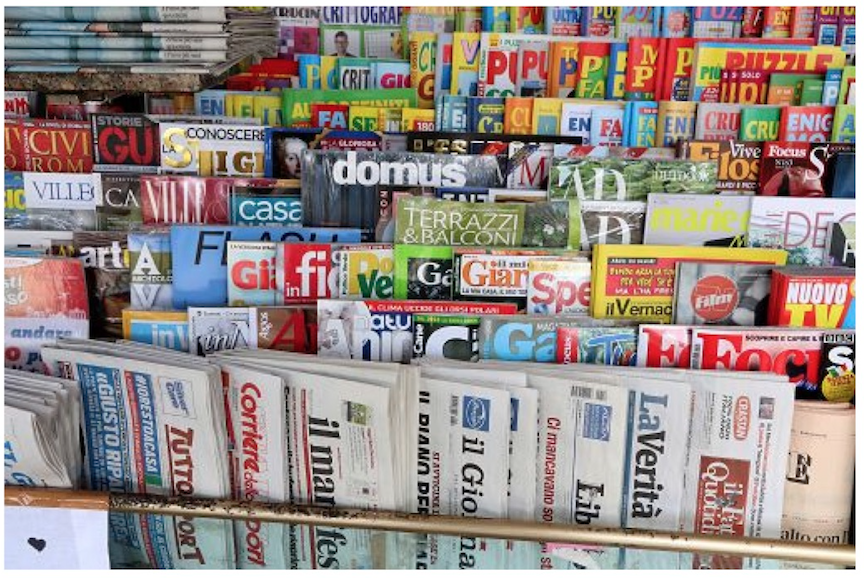
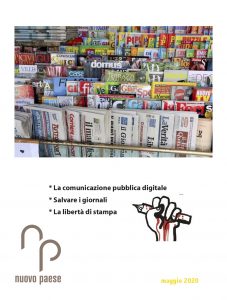 COVID-19 e tempo libero e denaro
COVID-19 e tempo libero e denaroÈ questo uno dei più importanti sviluppi politici di COVID-19: la propagazione globale di un sentimento di unione virtuale che rende i cittadini dipendenti da chi è incaricato di governare il loro benessere.L’altro importante sviluppo politico di questa pandemia è la forza finanziaria che è stata messa in moto.
This is one of the most important political developments from COVID-19 which has seen the global propagation of a virtual togetherness that leaves all citizens at the mercy of those entrusted to govern their welfare.

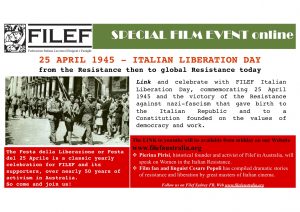
The Festa della Liberazione or Festa del 25 Aprile is a classic yearly celebration for FILEF and its supporters, over nearly 50 years of activism in Australia.
Pierina Pirisi, historical founder and activist of Filef in Australia, will speak on Women in the Italian Resistance,
Film fan and linguist, Cesare Popoli has compiled dramatic stories of resistance and liberation by great masters of Italian cinema
recorded by the Filef Group Bella Ciao in 1982.
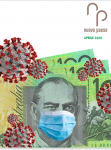
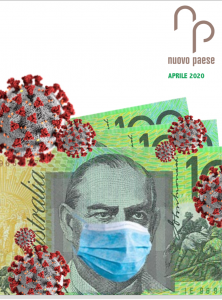
 Fear and fiscal largesse
Fear and fiscal largesse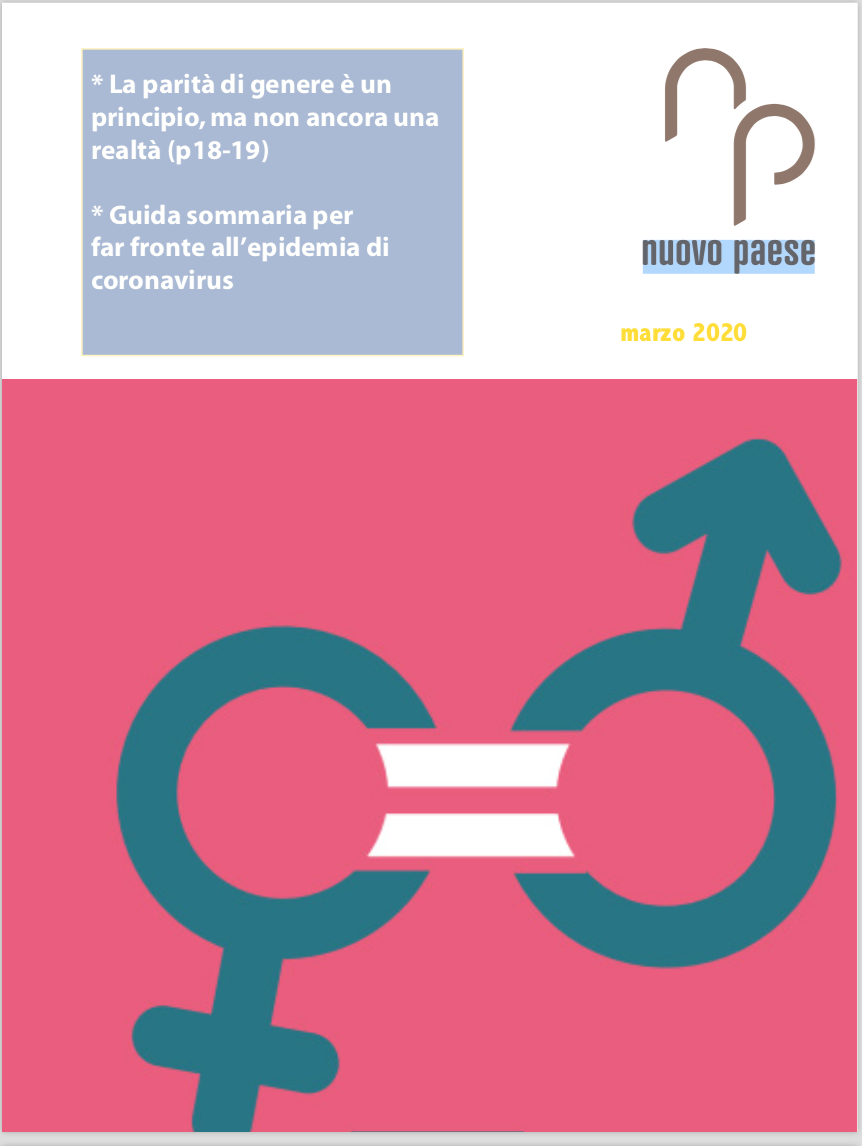
Se ti senti un po ‘depresso potresti essere in buona compagnia, perché secondo l’Australian Bureau of Statistics la malattia mentale colpisce un australiano su cinque.
 Editorial
Editorial
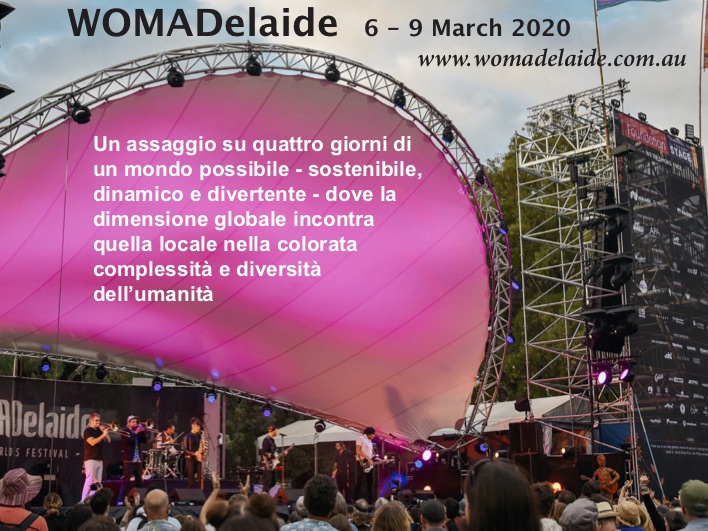

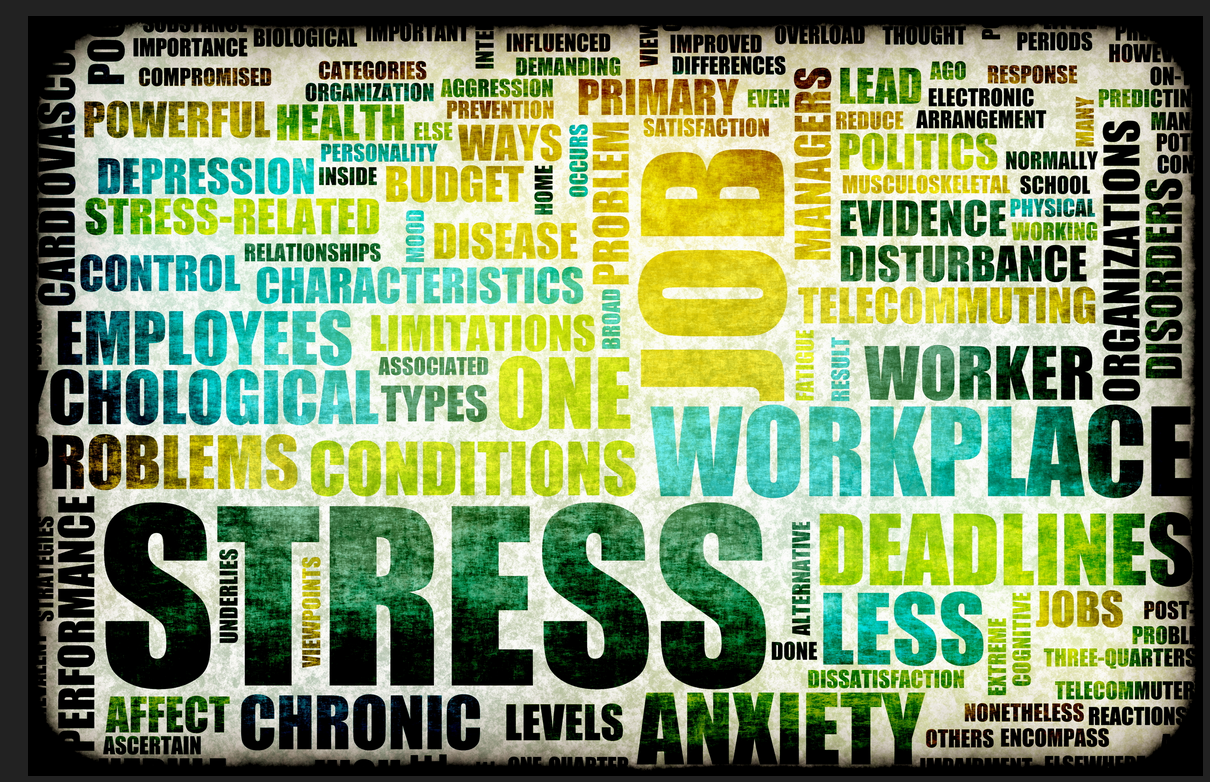
Incontro con il Prof. Bruno Piccoli, Professore di Medicina del Lavoro del Dipartimento di Biomedicina e Prevenzione, Sezione di Medicina del Lavoro dell’Università di Tor Vergata di Roma. Già Direttore della Scuola di Specializzazione in Medicina del Lavoro presso l’Università Cattolica di Roma.
A conclusione rinfresco e intervento musicale di Domenico de Cesare
RSVP: filef@internode.on.net; 8211 8842
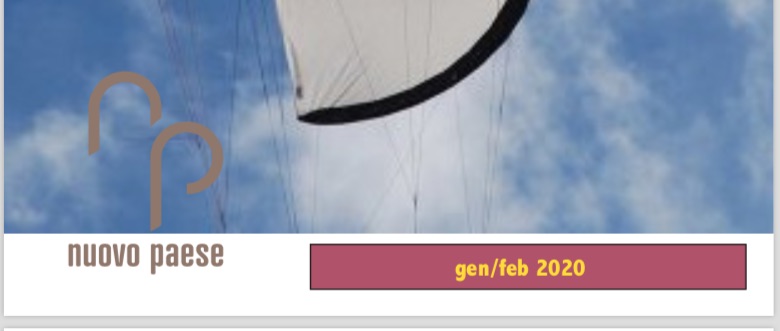


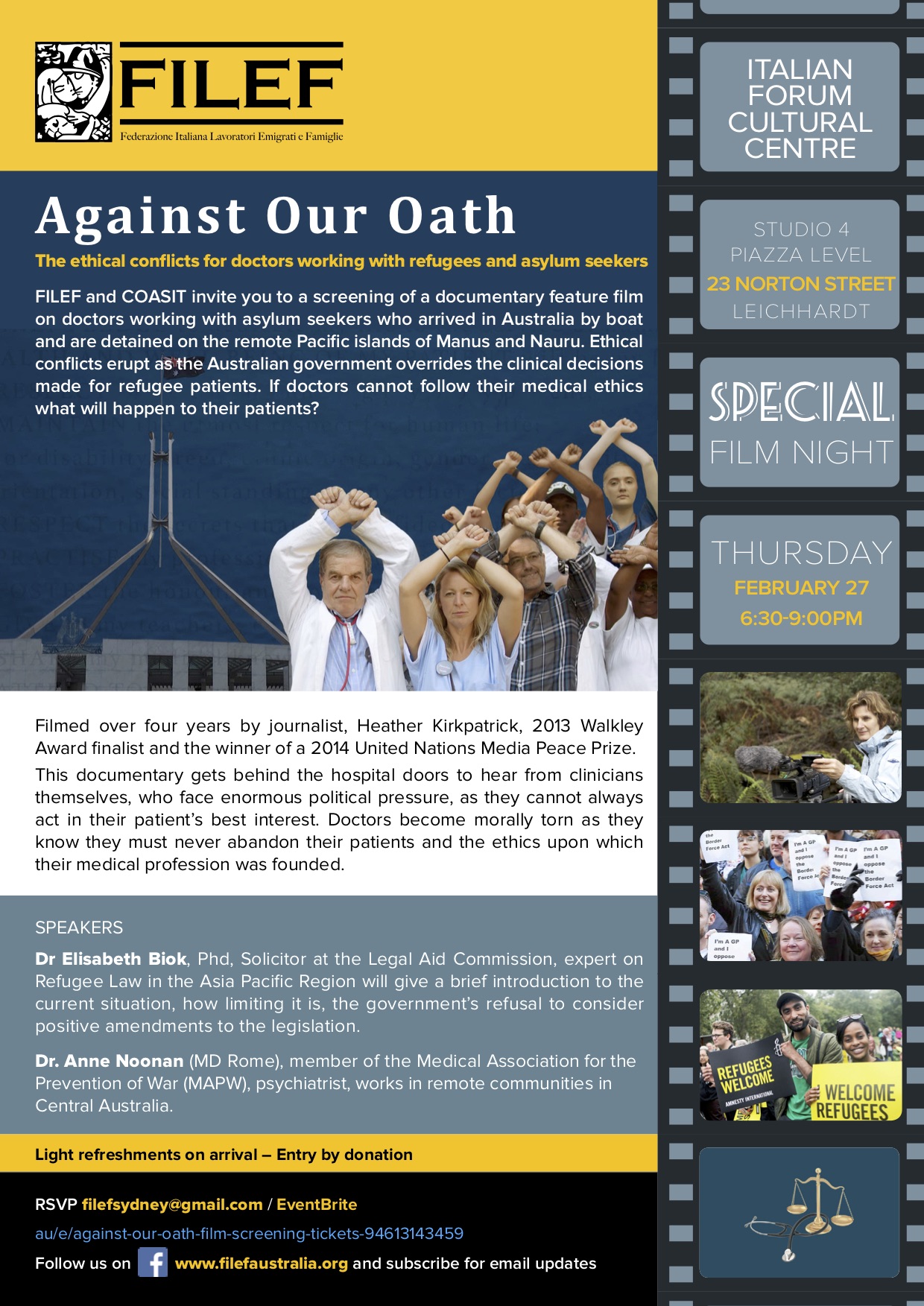
Studio 4, Italian Forum Cultural Centre, Piazza Level – 23 Norton Street Leichhardt
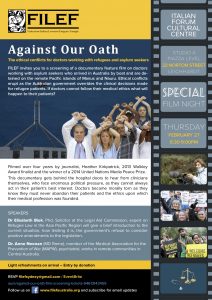
Filmed over four years by journalist, Heather Kirkpatrick, 2013 Walkley Award finalist and the winner of a 2014 United Nations Media Peace Prize.
This documentary gets behind the hospital doors to hear from clinicians themselves, who face enormous political pressure, as they cannot always act in their patient’s best interest. Doctors become morally torn as they know they must never abandon their patients and the ethics upon which their medical profession was founded.
Dr Elisabeth Biok, phd, Solicitor at the Legal aid Commission, expert on refugee Law in the asia pacific region will give a brief introduction to the current situation, how limiting it is, the government’s refusal to consider positive amendments to the legislation.
Dr. Anne Noonan (MD rome), member of the Medical association for the prevention of War (MapW), psychiatrist, works in remote communities in Central australia.
Q&A will follow. –
Light Refreshments on arrival – Entry by donation
RSVP filefsydney@gmail.com / EventBrite
Follow us on Filef Sydney FBook and Website and subscribe for email updates: filefsydney@gmail.com

 FILEF Adelaide Italian classes
FILEF Adelaide Italian classes
Corsi di Base/basic
32 wks $350; 10am – 12noon Thurs 5/3/20 code (bam)
32 wks $350; 6pm – 8pm Thurs 5/3/20 (bpm)
Corsi intermedi / intermediate
32 wks $350; 10am-12noon Weds 4/3/20 (iam)
32 wks $350; 6pm – 8pm Weds 4/3/20 (ipm)
Corsi avanzati B / advanced B
32wks $350; 10am-12noon Tues 3/3/20 (Abam)
32wks $350; 6pm – 8pm Tues 3/3/20 (Abpm)
Corsi avanzati A /advanced A
32wks $350; 10am-12noon Mon 2/3/20 (aAam)
32wks $350; 6pm – 8pm Mon 2/3/20 (aApm)
Full immersion playgroup
3-5 yrs; 10wks:$150 10-11.30am Sat 2/5/20 (B)

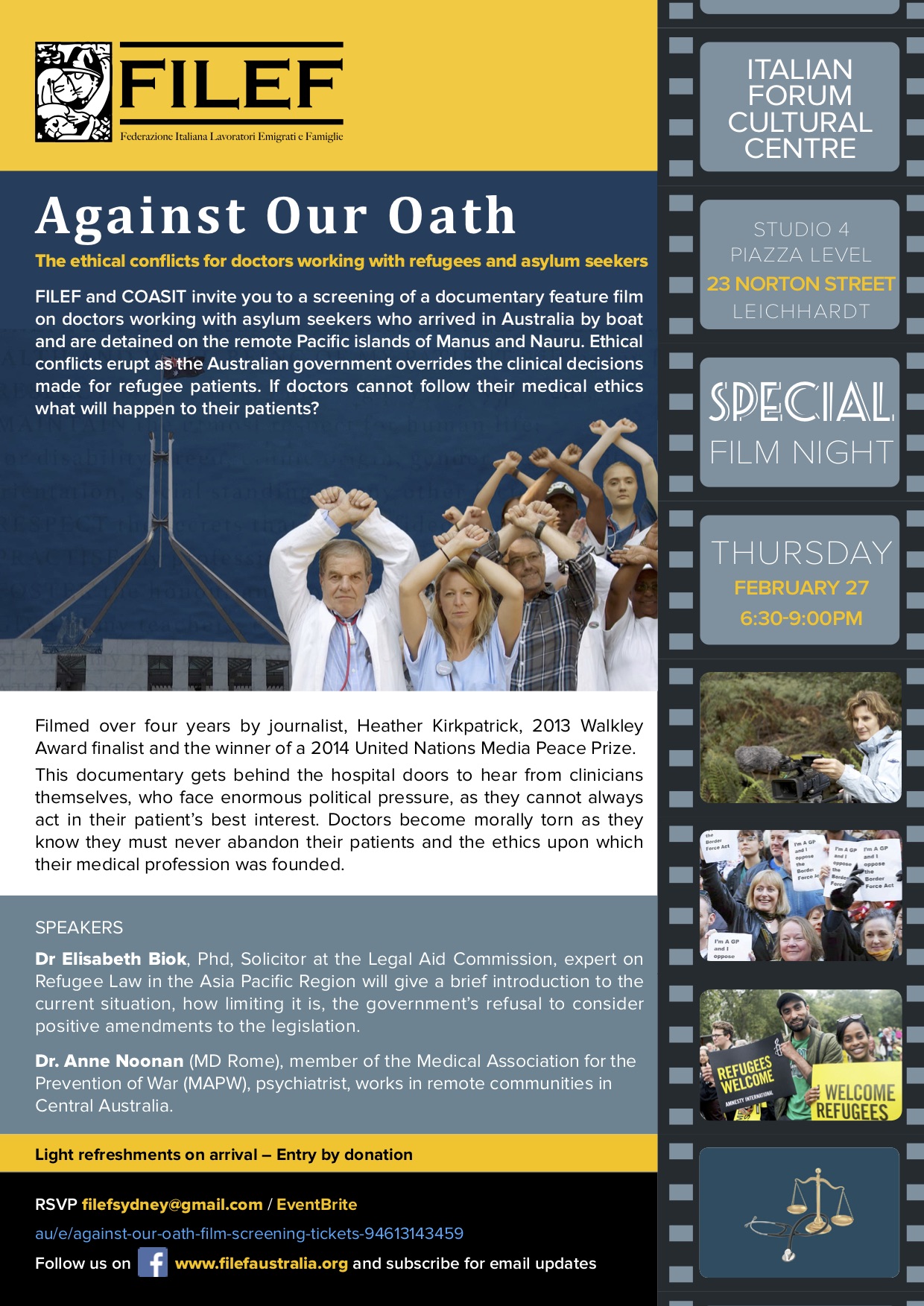

Screening of a documentary feature film on doctors working with asylum seekers who arrived in Australia by boat and are detained on the remote Pacific islands of Manus and Nauru. Ethical conflicts erupt as the Australian government overrides the clinical decisions made for refugee patients. If doctors cannot follow their medical ethics what will happen to their patients?
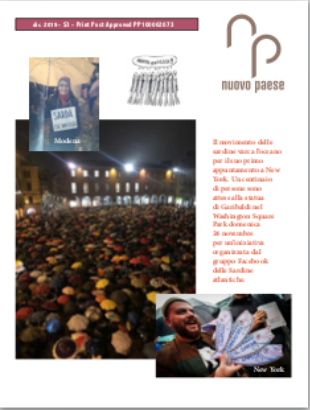

Ringraziamo vivamente tutti i nostri sostenitori per il loro contributo che ha permesso a Nuovo Paese di contribuire alla vita sociale e politica della comunità italo-australiana finora e, naturalmente, vi invitiamo a continuare a sostenerci inviando il vostro contributo anche rinnovando l’abbonamento di $30 annuali oppure con un abbonamento sostenitore di $50 annuali da versare sul conto bancario della rivista.

After 46 years of history told on paper – first as a fortnightly newspaper and then as a monthly magazine – Nuovo Paese will be published online as from next year and will be accessible by visiting the site http://filefaustralia.org
The Filef Australia website already offers the complete archive of 46 years of publications on paper. Unfortunately, the most important monthly costs for printing and shipping Nuovo Paese/New Country (about $ 2,300 for printing and paper and $ 600 for postage) are no longer sustainable for this modest non-profit organization.
Therefore, we will continue our commitment to spread news, opinions, comments and information, guided by the principles of peace, equality and social justice, while eliminating an economic burden that we are no longer able to sustain.
The positive thing, in addition to saving paper, is that like all the others we have been driven to conduct an ever increasing number of our activities online. The saving of this transformation should add more resources to support the Filef battles on human rights, social rights and, more urgently, the rights of nature.
Unfortunately the web – a reality made possible not only by Gates, Google or Facebook but by the whole of human progress, including Marconi’s contribution – is running a serious risk of becoming above all a commercial channel, often used in operations of control, disinformation and personal constraints rather than a channel of communication, cooperation, creativity and emancipation.
We warmly thank all our supporters for their contribution which has allowed the magazine to contribute to the social and political life of the Italian-Australian community so far and, of course, we invite you to continue to support us by continuing your contribution as well as activating or renewing the subscription of $ 30 yearly or with a supporter annual subscription of $ 50 to be paid into the magazine’s bank account:
Bank: BankSA
Account name: Nuovo Paese
BSB Number: 105-029
Account Number: 139437540
Let’s continue our monthly appointemnt in 2020 with Nuovo Paese online and we take the opportunity to offer our best wishes to all our readers and supporters of happy festive season and a happy new year 2020.
for Nuovo Paese
Frank Barbaro
Claudio Marcello
Sonja Sedmak
Rosi Paris
Bruno Di Biase


Corsi di base / basic
32 wks $350; 10am – 12noon Thurs 5/3/20 code (bam)
32 wks $350; 6pm – 8pm Thurs 5/3/20 (bpm)
Corsi intermedi / intermediate
32 wks $350; 6pm – 8pm Weds 4/3/20 (ipm)
Corsi avanzati B / advanced B
32wks $350; 10am-12noon Tues 3/3/20 (aBam)
32wks $350; 6pm – 8pm Tues 3/3/20 (aBpm)
Corsi avanzati A /advanced A
32wks $350; 10am-12noon Mon 2/3/20 (aAam)
32wks $350; 6pm – 8pm Mon 2/3/20 (aApm)
Full immersion playgroup 3-5 yrs;
10wks:$150 10-11.30am Sat 4/4/20 (B)